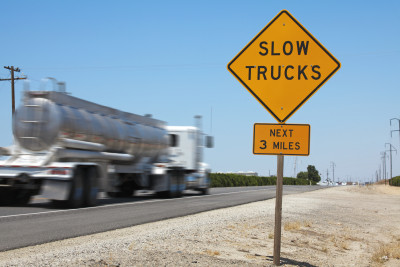OOIDA presents the case against speed limiter mandates
June 6, 2023
 In a press release from April of 2022, the Owner-Operator Independent Driver Association (OOIDA) voiced its disapproval for proposed rulemaking by the Federal Motor Carrier Safety Administration (FMCSA) that would mandate speed limiters for large trucks in the US. In the release, OOIDA argues that policies and devices that limit speeds for large trucks create unnecessary congestion and dangerous speed differentials among vehicles, which lead to higher accident involvement rates.
In a press release from April of 2022, the Owner-Operator Independent Driver Association (OOIDA) voiced its disapproval for proposed rulemaking by the Federal Motor Carrier Safety Administration (FMCSA) that would mandate speed limiters for large trucks in the US. In the release, OOIDA argues that policies and devices that limit speeds for large trucks create unnecessary congestion and dangerous speed differentials among vehicles, which lead to higher accident involvement rates.
“If you drive anywhere on the interstate, it doesn’t take long to get stuck behind two trucks running under the speed limit,” says Lewie Pugh, Executive Vice President at OOIDA. “It takes one truck a long, long time to pass the other one.”
The fact is, the speed of most trucks is already limited by constraints such as company policies, insurance concerns, and the demands of better fuel mileage. With these metrics being tracked electronically, truckers who drive with excessive speed will soon find themselves unemployed. Pugh argues that truckers are among the most safety-minded individuals on the road and attempts to artificially limit speeds will do nothing but increase risks for all travelers.
What are OOIDA’s arguments against mandating speed limiters on large trucks? Watch the latest episode of the Stay In Your Lane Podcast for an in-depth analysis of this important topic.
Mechanically limiting the speed of trucks on the highway can lead to a number of unfortunate outcomes, including road rage incidents. Impatient motorists who find themselves trapped behind a slow moving semi often give in to frustration, leading to risky driving behaviors such as passing on the right or even in the median. Allowing truckers to keep pace with prevailing speeds could actually be safer than enforcing a lower speed.
“Plenty of research shows that the highway is safest when all traffic is moving the same speed,” Pugh explains.
In Pugh’s view, government overreach plays a part in the speed-limiter debate. The Federal Government rolled back the nationwide speed limit of 55 miles per hour on America’s interstates in 1995. State engineers were given the power to set new speed limits on a state-by-state basis. Pugh believes that the federal government should also defer to state authorities when it comes to setting a safe speed limit for trucks in each state.
“I think it’s a poor thought process to think that Washington DC knows better of what the speeds on roads should be than the people who live and operate in those states,” he says. “At the end of the day, this is just shortsighted, ‘feel good’ legislation.”
Not all parties within the transportation industry are opposed to mandating speed limiters. The American Trucking Associations (ATA), perhaps motivated by a desire to limit insurance liabilities and increase fuel efficiency, petitioned the FMCSA to look at a rule for limiters. The FMCSA initiated a comment period on the topic, receiving record feedback with the majority of respondents against speed limiter mandates. The final recommendation from the FMCSA is still forthcoming.
A proposed piece of legislation that could put an end to this debate is currently working its way through congress. HR 3039 would remove FMCSA’s authority to mandate speed limiters on trucks travelling on our nation’s freeways. Those interested in backing this legislation can visit FightingForTruckers.com to contact their congressperson and show their support.
Triple T Transport is following the debate on speed limiters closely and will share updates as they unfold. In the meantime, be sure to subscribe to the Stay In Your Lane Podcast to stay up to date with all the latest news and trends from across the transport industry.













